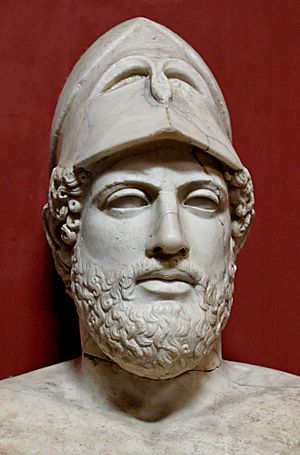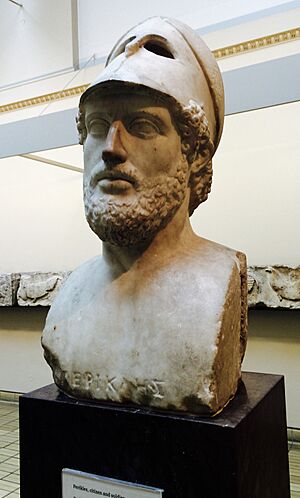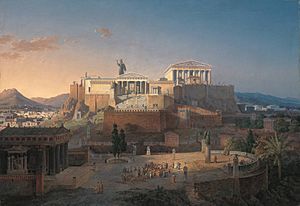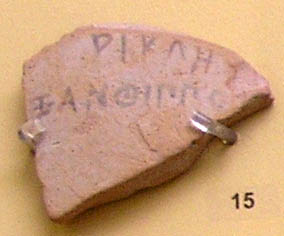Pericles facts for kids
Quick facts for kids
Pericles
|
|
|---|---|

Bust of Pericles bearing the inscription "Pericles, son of Xanthippus, Athenian". Marble, Roman copy after a Greek original from c. 430 BC, Museo Pio-Clementino, Vatican Museums,
|
|
| Born | c. 495 BC Athens, Greece |
| Died | 429 BC (aged c. 65 – 66) Athens, Greece |
| Allegiance | Athens |
| Rank | Strategos |
| Battles/wars |
|
| Spouse(s) | Aspasia of Miletus |
| Children | Paralus and Xanthippus Pericles the Younger |
| Relations | Xanthippus (father) Agariste (mother) |
Pericles (born around 495 BC, died 429 BC) was a very important Greek politician, speaker, and general. He lived during Athens's "Golden Age," a time when the city was very powerful and creative. Pericles was a major leader in Athenian politics, especially between the big wars with Persia and the Peloponnesian War. A famous historian named Thucydides called him "the first citizen of Athens," meaning he was the most important person there.
Contents
Pericles' Early Life
Pericles was born in Athens, Greece, around 495 BC. His father, Xanthippus, was a politician. Xanthippus was sent away from Athens for a time in 485–484 BC. But he returned to lead the Athenian army to victory at the Battle of Mycale just five years later.
Pericles' mother, Agariste, came from a powerful noble family called the Alcmaeonidae. Her family connections helped Xanthippus start his political career. Agariste was also related to important figures like Cleisthenes of Sicyon, a ruler of Sicyon, and Cleisthenes, an Athenian reformer.
Young Pericles had a quiet childhood. He avoided public life and spent his time studying. His family was rich enough to pay for a great education. He learned music from the best teachers of his time. He also enjoyed spending time with philosophers like Protagoras, Zeno of Elea, and Anaxagoras. Anaxagoras became a close friend and had a big influence on Pericles.
How Pericles Rose to Power
Pericles was a very wealthy man. He often gave money to ordinary people in the streets. As a member of the democratic party, he supported policies that helped the common people.
He first suggested a rule that allowed poor people to watch plays for free. The government would pay for their tickets. He also made it easier for people to become a high official called an archon in 458–457 BC. He also gave good wages to all citizens who served as jury members in the Heliaia, which was Athens's highest court.
His most debated rule was a law in 451 BC. This law said that only people whose parents were both Athenian could be citizens. This meant fewer people could become citizens.
Pericles quickly became very popular with the Athenians. By 461 BC, he was the clear leader of the democratic party.
Leading Athens' Golden Age

In 461 BC, Pericles became the leader of Athens after his predecessor was killed. He stayed in power until his death in 429 BC. The time he led Athens, from about 461 to 429 BC, is often called the "Age of Pericles."
Pericles changed the Delian League into an Athenian empire. He also led his people during the first two years of the Peloponnesian War. Pericles strongly supported Athenian democracy. Some people even called him a populist because he was so popular with the common people.
Pericles' Military Leadership
For over 20 years, Pericles led many military trips, mostly by sea. He was always careful and never started a battle if he wasn't sure of winning.
During the Peloponnesian War, Pericles used a defensive plan. His goal was to wear out the enemy. He believed Athens was stronger at sea than on land. Pericles was key to Athens's strong navy, which helped them succeed. The historian Plutarch said Pericles took great risks in battle. He was "the most noticeable of all in taking no care for his safety."
Pericles led the military to take back Delphi from the Spartans. He also led the navy to block the Peloponnesian peninsula.
Pericles' Cultural Impact
Pericles strongly supported the arts and literature. Because of his efforts, Athens became known as the center for education and culture in the ancient Greek world. He started a huge building project on the Acropolis. This included the famous Parthenon. This project made the city beautiful and safe. It also showed Athens's glory and gave jobs to its people.
Pericles' Role in Promoting Democracy
Early in his political life, Pericles worked with a politician named Ephialtes. Pericles and Ephialtes took away some of the powers of the nobles. Ephialtes was later killed.
Pericles continued to support democracy in Athens. He chose people for government jobs based on their skills, not their social class. He also increased the number of officials and paid them salaries. This allowed common people to get involved in politics and public jobs, which they couldn't do before.
Pericles believed that the ordinary people of Athens (the demos) were vital to Athens's military strength.
Pericles' Public Speaking Skills
Pericles was an excellent public speaker and a skilled orator. In Athens, being able to speak well and convince others was very important for democracy. Pericles was a master at both public speaking and persuading people.
Pericles' powerful speeches and speaking skills were famous throughout Athens's history. He was very good at convincing others to follow his ideas. His speech, known as "The Funeral Oration," is still seen as an example of how a leader can encourage people during tough times.
Pericles' Family Life
Pericles first married a close relative, as was common in Athens. They had two sons, Paralus and Xanthippus. Around 445 BC, Pericles divorced his wife. He arranged for her to marry another man, with his relatives' agreement. We don't know his first wife's name. We only know she was married to Hipponicus before Pericles and had a son named Callias from that first marriage.
After his divorce, Pericles had a long relationship with Aspasia of Miletus. They had a son named Pericles the Younger. Many important people in Athens respected Aspasia. However, because she was not from Athens, many people criticized their relationship.
Pericles' sister and both of his sons, Xanthippus and Paralus, died during the Plague of Athens. Just before he died, the Athenians changed the law from 451 BC. This allowed his son with Aspasia, Pericles the Younger, to become a citizen and his legal heir.
Pericles' Death
Pericles died from the plague in 429 BC.
Just before he died, Pericles' friends gathered around his bed. They talked about his good qualities during peacetime and mentioned his nine war victories. Pericles heard them and stopped them. He said they forgot to mention his greatest achievement: "for," he said, "no living Athenian ever put on mourning because of me." This meant he never caused anyone to grieve a death.
According to the historian Thucydides, Pericles' death was a disaster for Athens. He believed that the leaders who came after him were not as good.
Pausanias, a writer from around 150 AD, wrote that he saw Pericles' tomb along a road near the Academy.
Pericles' Lasting Legacy

Pericles' most obvious legacy can be seen in the art and writings from Athens's Golden Age. Much of this work still exists today. The Acropolis, even though it is in ruins, still stands. It is a symbol of modern Athens. Historian Paparrigopoulos wrote that these masterpieces are "enough to make the name of Greece immortal in our world."
The idea of freedom of expression is considered a lasting gift from this time. Pericles is praised as "the ideal type of the perfect statesman in ancient Greece." His Funeral Oration is now linked to the fight for democracy where people participate and have pride in their city.
Interesting Facts About Pericles
- According to Herodotus and Plutarch, Pericles' mother, Agariste, had a dream a few nights before he was born. She dreamed she had given birth to a lion. Legends say that Philip II of Macedon had a similar dream before his son, Alexander the Great, was born. The lion is a traditional symbol of greatness.
- Pericles had a very large head. This was a popular joke for comedians at the time. They called him "Squill-head," after the squill or sea-onion plant.
- His calm and self-control were legendary.
- In 1932, a botanist named Albert Charles Smith named a new plant after Pericles. It's called Periclesia and is a type of flowering plant from Ecuador.
- The outside of the ETH Zurich University Archives has a wall painting with Pericles' face. It is next to Homer and Aristotle.
Images for kids
-
Marble bust of Pericles with the Corinthian helmet, Roman copy of a Greek original, Museo Chiaramonti, Vatican Museums
-
Phidias Showing the Frieze of the Parthenon to Pericles, Aspasia, Alcibiades and Friends, by Sir Lawrence Alma-Tadema, 1868, Birmingham Museum & Art Gallery
-
Bust of Pericles after Kresilas, Altes Museum, Berlin
-
Anaxagoras and Pericles by Augustin-Louis Belle (1757–1841)
-
The Parthenon was prompted by Pericles.
See also
 In Spanish: Pericles para niños
In Spanish: Pericles para niños
 | Kyle Baker |
 | Joseph Yoakum |
 | Laura Wheeler Waring |
 | Henry Ossawa Tanner |









